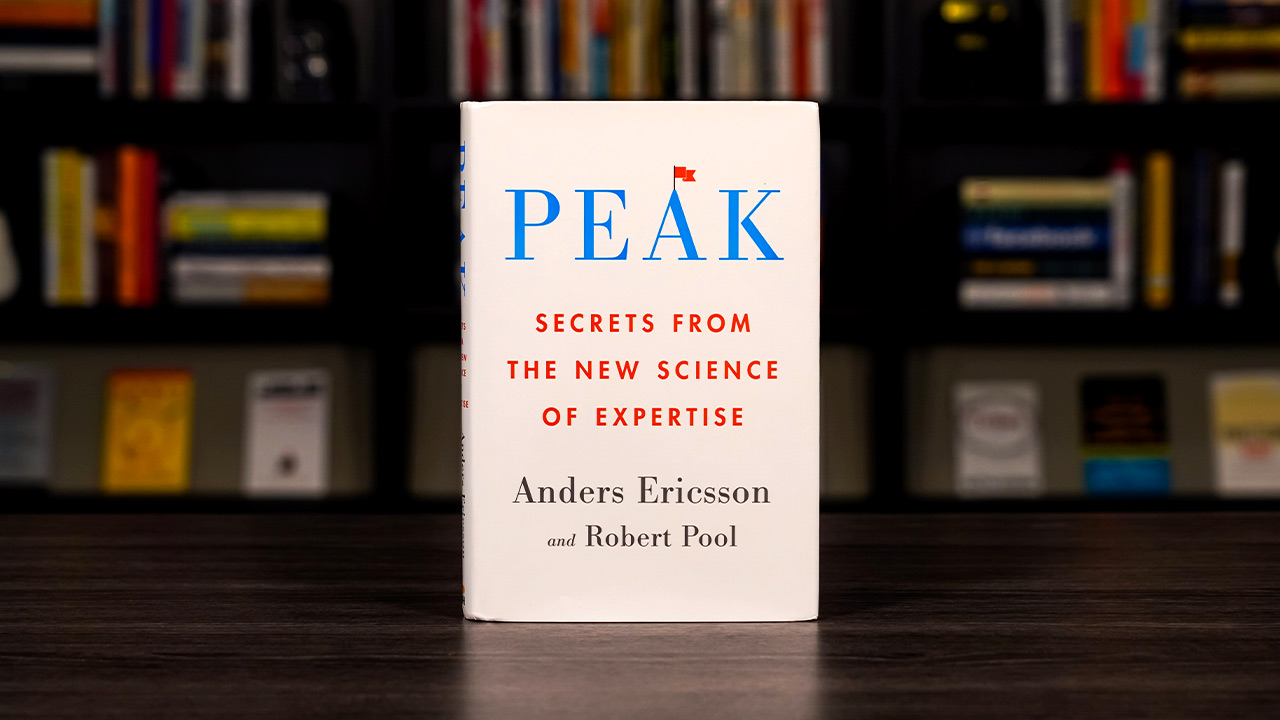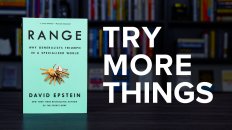One of the most common myths about experts and world-class performers is that natural talent plays a significant role in their success. This belief maintains that some people are born with innate abilities that make it far easier to do great things. In other words, they are gifted with an unfair advantage that we simply lack.
Peak by Anders Ericsson and Robert Pool is about the real secret behind the success of expert performers. It explains the remarkable adaptability of the human brain and how ‘deliberate practice’ allows us to master new skills and abilities. Furthermore, it covers practical tips and insights for anyone interested in improving themselves.
The Extreme Adaptability of The Human Brain
The truth is that talented people do have a gift, but it’s not the one we often assume it to be. Furthermore, we’re all given this same gift, and it’s far more powerful than many people realize. That gift is a brain that is flexible, adaptable, and capable of rewiring itself to unlock entirely new skills and abilities through deliberate practice.
Of course, there are cases where genetic endowment makes a difference. For example, physical traits like height or size are advantageous for playing basketball. However, what we now know is there’s no such thing as a predefined ability. The brain is adaptable and effective training allows us to create skills that did not previously exist.
Those considered gifted have simply made better use of the brain and body’s ability to adapt. By engaging in focused practice over a sufficient period, they now appear naturally talented. Fortunately, this book explains how anyone can take the same approach to achieve similar results in an area of their choosing.
Three Different Ways To Engage In Practice
Our ability to develop new skills requires that we invest time and effort into practice. However, not all practice is the same. Peak explains the critical differences between three approaches: naive practice, purposeful practice, and deliberate practice.
Naive Practice
Naive practice starts with the belief that repetition alone will help us improve. When first setting out to learn a new skill, like playing basketball, we focus on the basics, like dribbling, passing, and shooting. From there, we may aim to shore up a few clear weaknesses to reach an acceptable level of performance for playing the game.
However, it’s at this point that most people hit a plateau and stop improving, despite the assumption that additional playing time will help them improve. So, while we may continue to play regularly, that alone does little to help us get better. Depending on the activity, we may even see a slight decline in skill over time.
Purposeful Practice
Purposeful practice is focused on the achievement of specific, well-defined goals. It involves getting outside your comfort zone to learn a new skill in a focused way, with clear goals, a plan for reaching those goals, and a way to monitor your progress. Unlike naive practice, it requires clear expectations and total focus. The quality of the practice matters more than the quantity of time spent.
The hallmark of purposeful practice is always trying to do something you cannot already do. It involves practicing new skills repeatedly, focusing on exactly how you are doing them, where you are falling short, and how you can get better. The key to this is gathering reliable feedback, so you know if you’re improving.
Deliberate Practice
Deliberate practice follows the same core principles of purposeful practice. The key difference is it’s informed and guided by the best performers’ accomplishments and a deep understanding of what they did to excel. In short, deliberate practice is purposeful practice that knows where it’s going and how to get there.
Note, there are few fields in which deliberate practice can be applied in the strictest sense. Examples include chess, ballet, gymnastics, and musical performances. In each case, the underlying skills are very well understood. Furthermore, effective training methods have been established that predictably lead to mastery.
With that said, it’s possible to apply the principles of deliberate practice to less-developed pursuits. This involves using purposeful practice with a few extra steps. First, identify the best performers in the relevant field or area. Then, figure out what they do that makes them so effective. And finally, come up with training methods for reproducing their success.
It’s worth noting that deliberate practice is often unpleasant. It involves constantly pushing the boundaries of your abilities, often in solitary practice. To be effective, you must apply maximum effort and focus, even in the face of frustration and difficulty.
The Power Of Effective Mental Representations
Key to expert performance is the development of mental representations that make it easier to spot patterns, make sense of complexity, and identify the correct course of action in a given situation. Even when a skill is primarily physical, a significant factor is the development of proper mental models for engaging in the activity.
A mental representation is a cognitive structure that corresponds to an object, an idea, a collection of information, or anything else, concrete or abstract. For example, consider how the word “dog” allows people to communicate more efficiently about a pet. Three simple letters, or even just the sound they make, serve as a mental representation for a complex mammal with well-understood traits and behaviors.
This kind of efficient encoding of information is all around us. Almost everything we do, including walking, speaking, reading, and writing, is built on a complex web of mental representations. Without them, even the simple act of walking would require actively coordinating a complex series of muscle movements. It would be somewhat akin to the struggle of a first-time golfer attempting the subtleties of a proper golf swing.
The primary purpose of deliberate practice is to develop more and more effective mental representations. This initiates a virtuous cycle because better representations enable you to better monitor and evaluate your performance. Thus, the more skilled you become, the better your mental representations are, and the better your mental representations are, the more effectively you can improve your skill.
This is one reason why experts often appear to be fast learners. Their superior mental representations, developed through years of deliberate practice, provide a stronger foundation for adding related skills, abilities, and knowledge. So, while it may be true that they can learn faster today, that wasn’t always the case.
Practical Tips And Advice For Effective Learning
The core message of the book is that deliberate practice matters far more than innate abilities. It plays the most significant role in determining the rate at which you learn and grow. So, with that in mind, here are some additional tips to accelerate your progress.
- Find a good teacher. Even the most motivated student will advance more quickly under the guidance of someone who knows the best order in which to learn, who understands and can demonstrate various skills, who can provide helpful feedback, and who can devise effective practice routines.
- Focus on quality over quantity. If your mind is wandering or you’re relaxed and just having fun, you probably won’t improve. Short training sessions with clearer goals are the best way to develop new skills faster. It’s better to train at 100% effort for less time than at 70% effort for more extended periods.
- Identify and address areas for improvement. Any reasonably complex skill will involve a variety of components, some of which you will be better at than others. Thus, when you get stuck, try to identify the one or two elements holding you back and focus on making gradual improvements in those areas.
- Instead of trying harder, try differently. When you hit an apparent roadblock, rather than increasing effort, look for alternative ways to achieve the same result. Often multiple paths can be effective, so it’s just a matter of finding the most suitable one for you.
- Find ways to stay motivated. Investing in deliberate practice is a long and challenging road. It’s critical to find intrinsic or extrinsic motivators to keep you on track. This often begins with the belief that you’re capable of accomplishing your goal or objective. It’s also helpful to track your progress and seek recognition from others as a powerful source of motivation.
- Link progress with deliberate practice. As long as you connect the idea of progress with the many hours you’ve spent practicing, further practice will come to feel like an investment rather than a chore or obligation. This can help boost motivation and make the journey more rewarding.
- Get more sleep by napping. In one study outlined in the book, the best students averaged around five hours more of sleep per week than the merely good students. This was primarily achieved through making time for afternoon naps.
- Mix things up to avoid getting stuck. When you hit a plateau, the best way to move beyond it is to challenge your brain or body in a new way. Try a new approach to mix things up, so you can find unexpected ways to improve.
By following the core principles of deliberate practice and mixing in these tips, you too can become an expert in an area of your choosing. Natural ability and intelligence play a role, but far more critical is the time spent building effective mental representations.
Beyond The Peak Book Summary

This summary of Peak by Anders Ericsson and Robert Pool does not cover every tip or insight mentioned in the book. Instead, it provides a quick preview of the content to help you decide whether or not the topic is right for you.
If you’re interested in learning more about developing expertise or becoming a world-class performer, I recommend that you read the book. The original text provides a much richer and more detailed learning experience. You can pick up a copy from Amazon, Apple Books, or your favorite book retailer.
Are you looking for another interesting book to read? Consider exploring the best self-help books, the best productivity books, or the 50 best business books.
Do You Have A Question Or Comment?
Please visit the Peak book summary video on YouTube to share your thoughts in the comment section.


